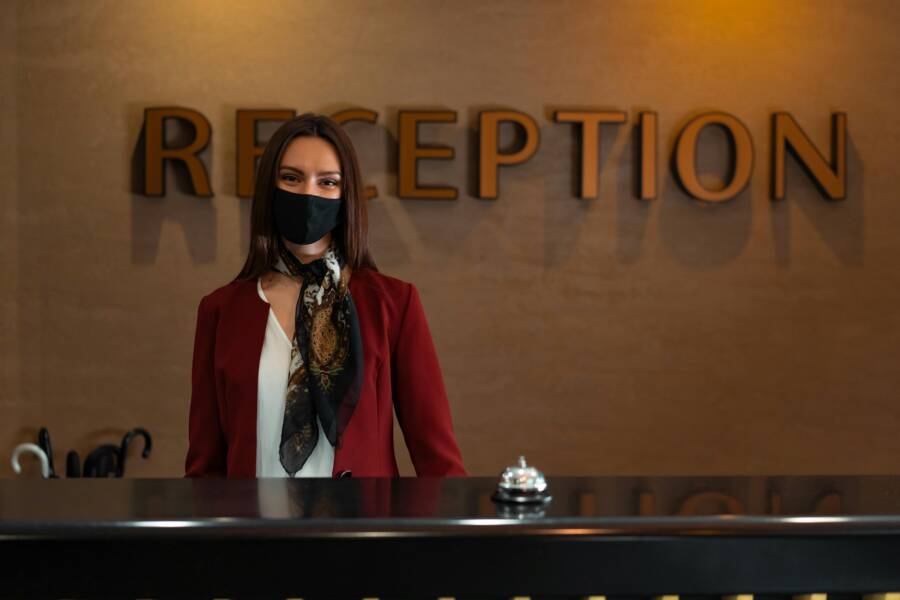Airline investors in the U.S. worry that the travel boom may be ending due to the faltering economy. However, despite the rising prices, Americans continue to prioritize their travel plans. A recent survey has revealed that 82% of the U.S. residents—over 212 million people—plan to travel this summer.
Travelers, however, are preferring private lodging options like Airbnb over hotels. They feel safe and secure in their personal space, and why not? From fire hazards to theft, hotels face various risks, which risk the safety of both guests as well as employees. As a hotel owner, you must step up your safety protocols, or guests won’t book you, and employees will quit their jobs.
Here, we’ll discuss some practical and effective ways hotels can maintain a secure environment for everyone.
#1 Make Sure all Emergency Equipment is Working Properly
Security cameras and video surveillance are necessary on hotel premises to prevent criminal activity and ensure guests’ safety. Your hotel must also have them installed. However, these pieces of equipment won’t be of any use if they aren’t working properly.
Check them periodically to ensure they are in working order. Regular inspections and maintenance checks will help you verify whether these devices function properly.
Fire is a common hazard in the hospitality business, and hotels are no exception. You must regularly examine the fire extinguishers on your premises for leakage, corrosion, or clogged nozzles.
Confirm that the pressure gauge or indicator is within the operable range or position, then lift the extinguisher to ensure it is still full.
Sprinkler systems require professional inspections to ensure they can effectively respond to fire situations. If you’ve got them installed on your premises, hire professionals to examine them.
#2 Implement a Visitor Management System
Imagine someone walks into your hotel and opens fire—sounds scary, right? But something similar happened recently at a hotel in Woodbridge Township. Someone opened fire at the Raritan Hotel at midnight and shot and wounded two police officers. Authorities are still searching for the suspect.
Had the hotel implemented a visitor management system, identifying the culprit wouldn’t have been difficult.
Visitor management software tracks and manages non-guest visitors, such as vendors, contractors, and guests, ensuring that only authorized individuals can access the premises. Consider implementing it into your premises.
With a visitor management system, your visitors will be required to check in, providing identification and the purpose of their visit. This information will be logged into a digital system, and you will have a detailed record of everyone who enters the hotel.
It can also issue temporary visitor badges, ensuring that all visitors are easily identifiable. There are pre-registration options for expected visitors, as well. These streamline the check-in process further, reducing wait times and improving efficiency.
You might think that implementing a visitor management system is expensive. But that is just a misconception. The cost of implementing this system, Greetly explains, is minimal since fewer security guards, front desk workers, and escorts are required to identify and welcome guests. Eventually, you’ll save a lot.
#3 Invest in Wearable Panic Buttons
When it comes to violent crimes, the most common offense is aggravated assault in 2022. That’s according to Pew Research Center’s findings. Hotels aren’t spared from it, either.
In March 2024, a guest assaulted a hotel worker both physically and verbally in West L.A. The man even slapped the phone out of the hands of the worker. A police report was filed, but it isn’t known if the worker was injured.
These kinds of incidents are scary, but they could also occur at your premises, leaving your staff vulnerable. That is why it is important to invest in wearable panic buttons.
Wearable panic buttons are discreet devices worn as bracelets, pendants, or clips. They feature a button that, when pressed, can notify the authorities that they are in danger. Should anyone try to assault your hotel staff, they can press the button and alert the security personnel.
These buttons are especially useful for housekeeping staff and those working in isolated areas of the hotel. That is because they often face unpredictable and potentially hazardous situations alone. However, make sure you conduct training sessions to ensure all staff members are familiar with using these devices effectively.
#4 Equip Rooms With Robust Security Features
Creating a positive guest experience is important if you want repeat bookings. One excellent way to do that is to equip your hotel rooms with robust security features.
Install high-quality locks on hotel room doors, including deadbolts and security chains, to provide an additional layer of protection against unauthorized entry. Peepholes are important, too. They will let your guests see who is outside before they open the door.
Offer safe deposits, as well. Your guests will be able to store their valuables, such as passports, jewelry, and electronics, securely. This will minimize the risk of theft.
To wrap things up, enhancing the safety of your guests and staff has become more important than ever due to the rising number of crimes. You can create a secure environment where both your guests and workers are protected by following these tips. Prioritizing safety will not only build guest confidence, but also empower your employees. Ultimately, it will contribute to the long-term success of your hotel.

Ingrid Maldine is a business writer, editor and management consultant with extensive experience writing and consulting for both start-ups and long established companies. She has ten years management and leadership experience gained at BSkyB in London and Viva Travel Guides in Quito, Ecuador, giving her a depth of insight into innovation in international business. With an MBA from the University of Hull and many years of experience running her own business consultancy, Ingrid’s background allows her to connect with a diverse range of clients, including cutting edge technology and web-based start-ups but also multinationals in need of assistance. Ingrid has played a defining role in shaping organizational strategy for a wide range of different organizations, including for-profit, NGOs and charities. Ingrid has also served on the Board of Directors for the South American Explorers Club in Quito, Ecuador.







